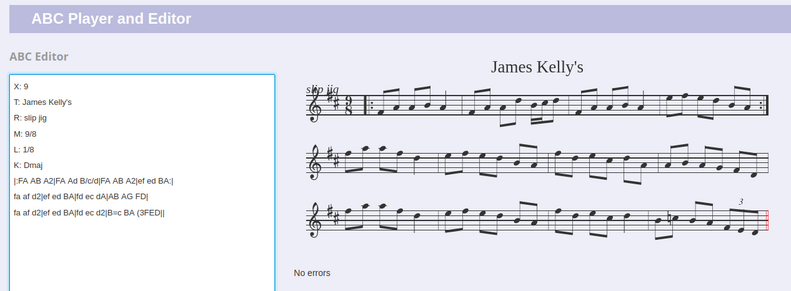klermór ⚓ · @klermor
53 followers · 124 posts · Server mamot.frNote: Valse à Ollu (A. Ollu) https://jolirouge.fr/shaare/ewFRUQ ```
X:1
T:Valse Ollu (A. Ollu)
C:Trad 1, 112
M:3/4
L:1/8
K:C
AB cd ef|e2d2c2|dG Bd eg|e2d2B2|\
AB cd ef|e2d2c2|dG Bd ed|c2B2G2:|
L:1/4\
|:A>Bc|A>Bc|B>cd|cBG|\
A>Bc|A>Bc|B>cd|cBG:|**
``` #ABCnotation #musique #valse
Phil · @Phil
102 followers · 420 posts · Server folksocial.orgA free hour before spending all day staring at the computer for work. So what do I do? Sit down in front of the computer to tidy up the .abc of some music of course! To be fair, doing an hour's actual music practice would be a bit unsociable at 7am.
Tathar makes stuff · @Tathar
25 followers · 27 posts · Server furry.engineerI used to transcribe a bunch of video game music [and a few others that caught my interest] to #ABCnotation to post on StarBards.net and play in bands on their Starbound server. Here's one I transcribed by hand: https://www.youtube.com/watch?v=fQPOpEJRE7o
I still have most of what I uploaded, and I feel like getting back into it (though not for Starbound) as a hobby. The only one I know that I'm missing is the G Free ~ Final Dream one I never finished.
iN8sWoRLd · @in8sworld
3 followers · 3 posts · Server fosstodon.orgI've spent a fair amount of time playing #irishtrad over the years and often find I like to write down a new piece or modify one I'm learning. For doing this on the computer I've used lots of programs over the years but I keep coming back to simple plain text #abcnotation and the editor I use the most is available free online. Paul Rosen's #abcjs - https://github.com/paulrosen/abcjs can be used under the MIT license. A UK based IT consulting firm has a great example here: https://abc.rectanglered.com/
#irishtrad #abcnotation #abcjs
Ryuno-Ki · @RyunoKi
574 followers · 12542 posts · Server layer8.space#TIL There is a #GUIDO music notation - Wikipedia
https://en.wikipedia.org/wiki/GUIDO_music_notation
I was aware of #abcnotation before.
I've heard of #lilypond in context of #LaTeX, too.
#til #GUIDO #abcnotation #lilypond #latex
Alice and the moon🌛 · @loveisanalogue
85 followers · 1822 posts · Server mastodon.artThe two main tools for ABC notation are abcm2ps (converts ABC notation to score: https://github.com/lewdlime/abcm2ps ) and abc2midi (converts ABC notation to midi: https://ifdo.ca/~seymour/runabc/top.html ).
There are some editors that wrap these tools together. I've not had luck with EasyABC on Ubuntu, but I was able to build Qabc (https://github.com/be1/qabc ) which is minimal, but does everything I need it to.
Alice and the moon🌛 · @loveisanalogue
85 followers · 1822 posts · Server mastodon.artThe whole Audacity thing makes me sad, but here's some good that came out of it: thinking of alternatives to MuseScore (same company that acquired Audacity), I re-discovered ABC notation.
It turns out that, while MuseScore is (imo) the best free/open-source graphical score editing software, transcribing a song is _much_ easier using ABC notation than using a graphical editor.
See https://en.m.wikipedia.org/wiki/ABC_notation for overview. And here's a good reference: https://abcwiki.org/abc:syntax
Banjos & Such · @mayor
157 followers · 2117 posts · Server banjo.townDefinitely a lot faster for the initial basic input (not having to keep track of key-native accidentals is life-changing) and if I can fine-tune conversion settings and come up with tooling to tweak and optimize some banjo-specific stuff I feel like it will cut cumulative hours from the process of transcribing stuff from the old tutor books. :fbc: #lilypond #abcnotation #sheetmusic
#sheetmusic #abcnotation #lilypond
Banjos & Such · @mayor
157 followers · 2117 posts · Server banjo.townI was today years old when I realized that ABC notation is actually pretty powerful :eye:
I do not remember when or why I wrote it off as a tool for music notation (years ago at this point), but I'm feeling pretty sheepish for having done so.
LilyPond is still where it's at for generating nicely engraved sheet music but I think ABC is going to be a lot faster for actually inputting music once I get the hang of it... and then the toolchain of abc2xml > musicxml2ly results in a surprisingly clean and human-readable LilyPond file.
And of course there is a *ton* more ABC content floating around on the internet than LilyPond. #abcnotation #lilypond #musicnotation #fediversemusic
#fediversemusic #musicnotation #lilypond #abcnotation

